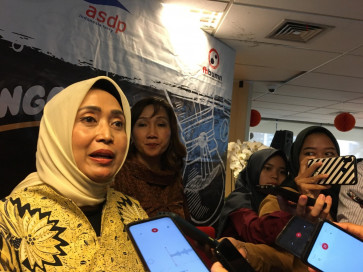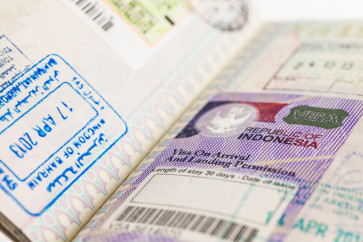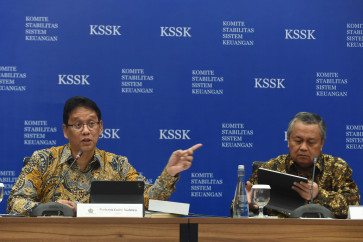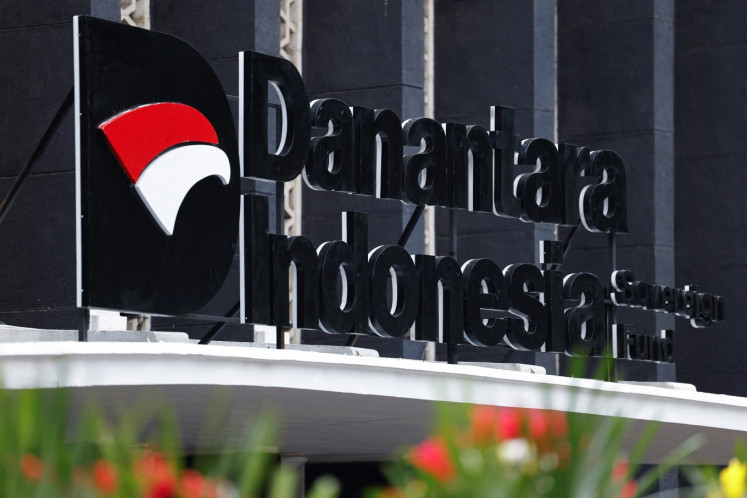Popular Reads
Top Results
Can't find what you're looking for?
View all search resultsPopular Reads
Top Results
Can't find what you're looking for?
View all search resultsRI migrant workers find home away from home in HK
Indonesian migrant workers have an invisible presence in Hong Kong - but their work is indispensable
Change text size
Gift Premium Articles
to Anyone
I
ndonesian migrant workers have an invisible presence in Hong Kong - but their work is indispensable.
Deep in Hong Kong's always-impressive financial statistics is data on the territory's domestic workers. If you don't already know, Indonesians comprise the largest single group of domestic workers in Hong Kong and number in the hundreds of thousands.
The workers perform menial jobs, such as cleaning house, laundry, cooking, baby-sitting, grocery shopping and caring for the elderly.
Imagine if Hong Kong's residents had to perform these chores themselves. Activities at the Hong Kong Stock Exchange or at the city's hundreds of lush shopping malls would screech to a halt.
Hong Kong has 129,612 migrant workers from Indonesia and 128,630 from the Philippines. Migrant workers from Thailand, Nepal, Sri Lanka, Bangladesh and India number only 7,356, according to reports from the the Hong Kong Immigration Office.
Five years ago, Filipinos comprised the largest single sent the largest number of migrant workers to the former British colony. In 2005, 60,000 Filipinos worked in Hong Kong. More Indonesian workers came to Hong Kong, after learning that life had been pretty good for migrant workers.
"I like it here. My employers and their family are good people," Amalia, 27, from Jember, East Java told The Jakarta Post, while attending a wheelchair-bound elderly woman on a pier on Java Street.
Amalia has spent six years in Hong Kong and said that life had treated her kindly. "I get at least one day off every week. This way I can have one full day toattend a get together with fellow Indonesians at Victoria Garden and have fun," she said.
Migrant workers are a fixture and are found everywhere in Hong Kong. Indonesians are easily spotted because of their thick accents when speaking the local languages of Java.
Part of the reason behind the growing number of Indonesians in Hong Kong is adaptability, an Indonesian consulate official said. Indonesian workers can learn Cantonese easily and adapt to local customs. Indonesian workers have a reputation for flexibility, and are willing to work weekends, he added.
Many Indonesian workers finish their chores Saturday before they go out to enjoy their free time, the official said.
The consulate developed new programs, which have the slogan "Service-based Protection", aimed at helping Indonesians working in Hong Kong.
Migrant workers in Hong Kong enjoy benefits that have eluded those who work in other countries, especially in the Middle East, said Ferry Adamhar, Indonesian's Consulate General in Hong Kong.
"Their faces were always glum *in the Middle East*, burdened by many problems. In Hong Kong, you can see smiles on their faces," Ferry said.
The consulate has established a community outreach program so migrant workers can express themselves. "I hope those who come here can make a contribution to arts, culture and sports - and not just come *to the consulate* for protection," he said.
Some migrant workers have even participated in the consulate's cultural nights.
"We feel closer to the Consulate General now. We can find shelter from inhospitable treatment," said Wati, 32, who works in Wan Chai district.
The consulate will provide crash course on local customs and regulations to new arrivals to Hong Kong and brief departing workers on how their skills can be applied in Indonesia.
Hong Kong, a democratic enclave in communist China, allows workers to unionize. Most Indonesians join the Indonesian Migrant Workers Union (IMWU), which is affiliated with the Federation of Asian Domestic Workers Union (FADWU).
"We have the support of the labor union here," said Srigantin, a representative of IMWU in Hong Kong.
Srigantin led union members in a peaceful rally in front of the Indonesian Consulate General to commemorate May Day.










